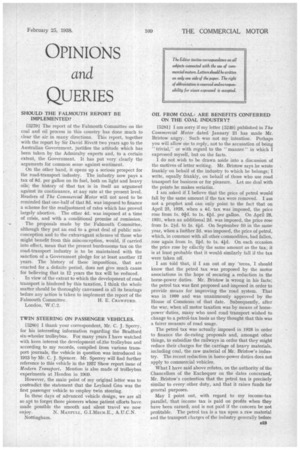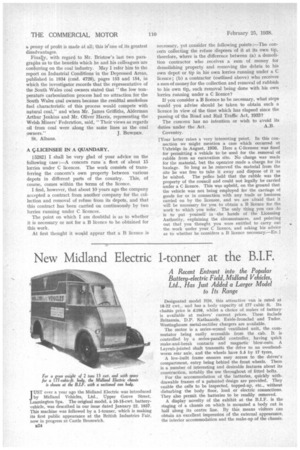OPINIONS and QUERIES
Page 61

Page 62

If you've noticed an error in this article please click here to report it so we can fix it.
SHOULD THE FALMOUTH REPORT BE IMPLEMENTED?
i52791 The report of the Falmouth Committee on the coal and oil process in this country has done much to clear the air in many directions. This report, together with the report by Sir David Rivett two years ago to the Australian Government, justifies the attitude which has been taken by the Admiralty experts and, to a certain extent, the Government. It has put very clearly the arguments for common sense against sentiment.
On the other hand, it opens up a serious prospect for the road-transport industry. The industry now pays a tax of 8d. per gallon on its fuel, both on light and heavy oils; the history of that tax is in itself an argument against its continuance, at any rate at the present level. Readers of The Commercial Motor will not need to be reminded that one-half of that 8d. was imposed to finance a scheme for the readjustment of rates which has proved largely abortive. The other 4d. was imposed at a time of crisis, and with a conditional promise of remission.
The proposals made by the Falmouth Committee, although they put an end to a great deal of public misconception and to the extravagant schemes of those who might benefit from this misconception, would, if carried into effect, mean that the present burdensome tax on the road-transport industry is to be maintained with the sanction of a Government pledge for at least another 12 years. The history of these impositions, that are enacted for a definite period, does not give much cause for believing that in 12 years the tax will be reduced.
In view of the extent to which the development of road transport is hindered by this taxation, I think the whole matter should be thoroughly canvassed in all its bearings before any action is taken to implement the report of the Falmouth Committee. 11. E. CRAWFURD. London, W.C.2.
TWIN STEERING ON PASSENGER VEHICLES.
[5280] I thank your correspondent, Mr. C. J. Sperry, for his interesting information regarding the Bradford six-wheeler trolleybus. For many years I have watched with keen interest the development of-the trolleybus and according to my records, compiled from various transport journals, the vehicle in question was introduced in 1913 by Mr. C. J. Sciencer. Mr. Sperrey will find further reference to this vehicle in the 1937 Show report issue of Modern Transport. Mention is also made of trolleybus experiments at Hendon in 1909.
However, the main point of my original letter was to contradict the statement that the Leyland Gnu was the first passenger vehicle to employ twin steering.
In these days of advanced vehicle design, we are all so apt to forget those pioneers whose patient efforts have made possible the smooth and silent travel we now enjoy. N. MmcruLL, A.U.C.N. Nottingham. OIL FROM COAL: ARE BENEFITS CONFERRED • ON THE COAL INDUSTRY?
[52811 I am sorry if my letter [52491 published in The Commercial Motor dated January 21 has made Mr. Bristow angry. Such was not my intention. Perhaps you will allow me to reply, not to the accusation of being "trivial," or with regard to the " manner " in which I expressed myself, but on the facts.
I do not wish to be drawn aside into a discussion of the motives of letter writing. Mr. 13ristow says he wrote frankly -on behalf of the industry to which he belongs; I write, equally frankly, on behalf of those who use road transport for business or for pleasure. Let me deal with the points he makes seriatim.
I am asked if I believe that the price of petrol would fall by the same amount if the tax were removed. I am not a prophet and can only point to the fact that on April 25, 1928, when a 4d. tax was imposed, the price rose from Is. Old. to Is. 41d. per gallon. On April 28, 1931, when an additional 2d. was imposed, the price rose from 1s. 2id. to is. 4-1d. On September 10 in the same year, when a further 2d. was imposed, the price of petrol, which, in common with all other commodities, had fallen, rose again from Is. 21d. to is. 40. On each occasion the price rose by exactly the same amount as the tax; it is at least probable that it would similarly fall if the tax were taken off.
I am told that, if I am out of my 'teens, I should know that the petrol tax was proposed by the motor associations in the hope of securing a reduction in the horse-power duties. Mr. Bristow is wrong in his facts; the petrol tax was first proposed and imposed in order to provide means for improving the road system. That was in 1909 and was unanimously approved by the House of Commons of that date. Subsequently, after the war, when all motor taxation was by means of horsepower-duties, many who used road transport wished to change to a petrol-tax basis as they thought that this was a fairer measure of road usage.
The petrol tax was actually imposed in 1928 in order to finance the de-rating proposals and, amongst other things, to subsidize the railways in order that they might reduce their charges for the carriage of heavy materials, including coal, the raw material of Mr. Bristow's industry. The recent reduction in horse-power duties does not apply to commercial vehicles.
What I have said above refutes, on the authority of the Chancellors of the Exchequer on the dates concerned, Mr. Bristow's contention that the petrol tax is precisely similar to every other duty, and that it raises funds for general purposes.
May I point out, with regard to my income-tax parallel, that income tax is paid on profits when they have been earned, and is not paid if the concern be not profitable. The petrol tax is a tax upon a raw material and the transport charges of the industry generally before a penny of profit is made at all; this ienne of its greatest disadvantages.
Finally, with regard to Mr. Bristow's last two paragraphs as to the benefits which he and his colleagues are conferring on the coal industry. May I refer him to the report on Industrial Conditions in the Depressed Areas, published in 1934 (cmd. 4728), pages 153 and 154, in which the investigator records that the re-presentative of the South Wales coal owners stated that "the low temperature carbonization process had no attraction for the South Wales coal owners because the residual smokeless fuel characteristic of this process would compete with natural coal," and when Mr. James Griffiths, Alderman Arthur Jenkins and Mr. Oliver Harris, representing the Welsh Miners' Federation, said, "Their views as regards oil from coal were along the same lines as the coal owners." J. BOWDE,N. St. Albans.
A c-LICENSEE IN A QUANDARY.
152221 I shall be very glad of your advice on the following case :—A concern runs a fleet of about 15 lorries under C licences. The work consists of transferring the concern's own property between various depots in different parts of the country. This, of course, comes within the terms of the licence.
I find, however, that about 10 years ago the company accepted a contract from another company for the collection and removal of refuse from its depots, and that this contract has been carried on continuously by two lorries running under C licences.
The point on which I am doubtful is as to whether it is necessary or not for a B licence to be obtained for this work.
At first thought it would appear that a B licence is necessary, yet consider the following points ;—The concern collecting the refuse disposes of it at its own tip, therefore, where is the difference between (a) a demolition contractor who receives a sum of money for demolishing property and removing the debris to his own depot or tip in his own lorries running under a C licence; (b) a contractor (outlined above) who receives a sum of money for the collection and removal of rubbish to his own tip, such removal being done with his own lorries running under a C licence?
If you consider a B licence to be necessary, what steps would you advise should be taken to obtain such a licence in view of the time which has elapsed since the passing of the Road and Rail Traffic Act, 1933?
The concern has no intention or wish to avoid its duties under the Act. A.B. Coventry.
Your letter raises a very interesting point. In this connection we might mention a case which occurred at Uxbridge in August, 1936. Here a C-licensee was fined for permitting a vehicle to be used for the removal of rubble from an excavation site. No charge was made for the material, but the operator made a charge for its haulage. So long as he removed the material from the site he was free to -take it away and dispose of it as he wished. The police held that the rubble was the property of the council and could not legally be carried under a C licence. This was upheld, on the ground that the vehicle was not being employed for the carriage of goods for or in connection with any trade or business carried on by the licensee, and we are afraid that it will be necessary for you to obtain a B licence for the work to which you refer. The only thing you can do is to put yourself in the hands of the Licensing Authority, explaining the circumstances, and pointing out that you thought you were entitled to carry out the work under your C licence, and asking his advice as to whether he considers a B licence necessary.—Eo.]
































































































